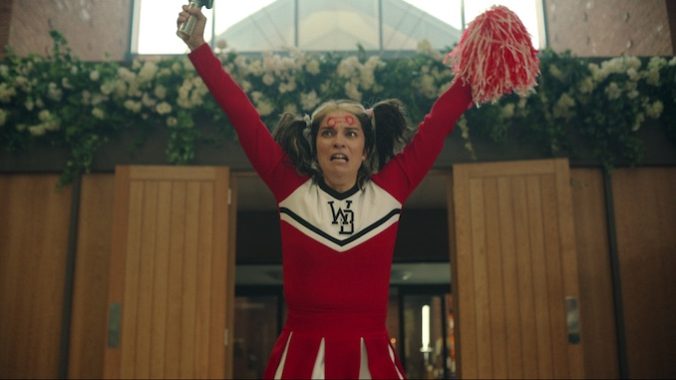Black Mirror Struggles to Imagine the Future in an Uneven Season 6
Photo Courtesy of Netflix
In the 4 years since Black Mirror last aired an episode, technology has changed a lot. AI is capable of creating realistic looking images and writing entire research papers. Apple is trying to make Google Glass a thing again. And we’ve all been forced to learn about the Metaverse and how crypto currency works, since their failures can tank the stock market. With all these new developments, Black Mirror has a wealth of new material to spin with its uniquely sardonic take on technology.
Season 6 is a frustrating return to form, yet simultaneously attempts to step out of Black Mirror’s shell. There is a pervasive feeling that Charlie Brooker and Co. are beginning to feel locked into the show’s premise. The majority of the new episodes are period pieces or take place in the present. What ever happened to imagining the future?
The first episode of the anthology series, “Joan is Awful,” feels in line with how the show has changed since moving to Netflix. It boasts an impressive cast (Annie Murphy, Salma Hayek, Michael Cera, Ben Barnes, and Himesh Patel, to name a few) to fill out its meta-commentary on streaming itself. Season 6’s opener concerns the future of AI generated content, which has become a major topic since the recent WGA strike and possible upcoming SAG strike. Writers and actors understand that, when you put creative decisions in the hands of a machine, art as we know it will never be the same.
“Joan is Awful” is a fun romp at times and delivers some great jabs at Netflix. The fictional Netflix surrogate “Streamberry” begins to create AI-generated shows about normal people, highlighting their worst qualities to keep every subscriber hate watching. It’s goofy, prescient, and allows Murphy and Hayek to have an absolute ball. But there’s a pervasive feeling of “what else?” once the credits roll. “Netflix is evil” and “people aren’t content” is great, but Black Mirror becomes truly special when it takes it one step forward. Neither the optimism nor the humiliation of “Joan is Awful” are surprising or introspective enough.
The second episode “Loch Henry” is a critique of the true crime obsession that has taken over pop culture. Film students Davis and Pia travel to Davis’s small Scottish hometown that’s become abandoned since a series of gruesome murders decades prior. They decided to make a documentary about the events to help promote some dark tourism and launch their careers. The twist can be seen from a million miles away, but “Loch Henry” still gets one great Black Mirror gut punch at the end.
“Joan is Awful” and “Loch Henry” work together as a pair. Both are indictments on content culture and the vapid way we will watch anything at the expense of empathy. But this is an idea Black Mirror has been thinking about since its first season. “Fifteen Million Merits” was also about putting content obsession above basic dignity, but did so in a wholly original world. Brooker is struggling to convey the same ideas in a way fresher than he did at the beginning. The result are episodes that are incredibly watchable (I have no doubt there will be plentiful memes about “Joan is Awful” in particular), but feel like less than Brooker is capable of.
If Season 6 has one shining star, it is “Beyond the Sea.” The 1969-alternate-future space episode depicts astronauts Cliff (Aaron Paul) and David (Josh Hartnett) drifting above the Earth while being able to awaken their consciousnesses in robot replicas that live out their normal lives when they aren’t needed. A Manson family-esque act of violence thrusts David into isolation, and the two begin to share Cliff’s body. The feature-length episode is enthralling and horrifying in all the best ways. It’s less a warning about the perils of technology and more of a speculative space dream imagined by Brooker.
-

-

-

-

-

-

-

-

-

-

-

-

-

-

-

-

-

-

-

-

-

-

-

-

-

-

-

-

-

-

-

-

-

-

-

-

-

-

-

-








































